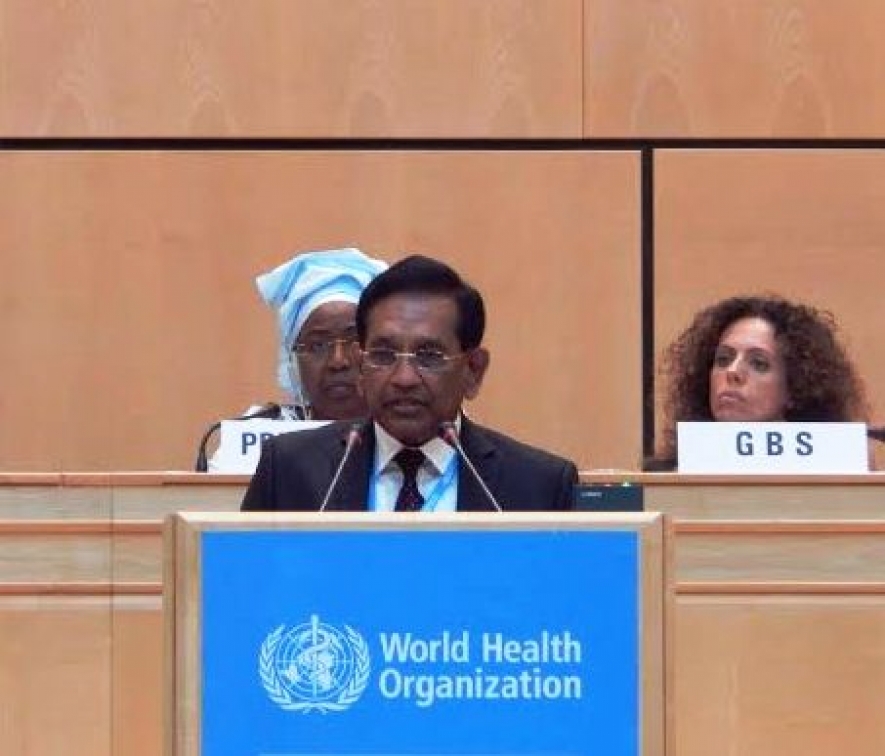Highlighting the health scenario in the country he said that under the guidance of President Maithripala Sirisena, the country is poised to enter a new phase of health development and pointed out that the health burden of the country is now moving more towards non communicable diseases, such as cardiovascular, respiratory neoplasm and diabetes, which account to over 70% of deaths.
Following is the Full text of Address by Hon. Dr. Rajitha Senaratne, Minister of Health and Indigenous Medicine of Sri Lanka on “Building Resilient Health Systems” at the 68th World Health Assembly in Geneva :
While associating myself with the NAM and the G- 15 statements, I wish to congratulate Hon Jagat Prakash Nadda, Minister of Health of India, on his election as the president of the 68th World Health Assembly. Along with my fellow Ministers present here today, may I also take this opportunity to convey our condolences to the government of Nepal and its people for the sad loss of life and property due to the recent earthquake.
Sri Lanka took measures to mobilize our experienced emergency rescue and relief teams within 24 hours of this calamity, to support Nepal and its people, in their hour of need, and I wish to offer our continuing support to face the wide ranging challenges faced by the nation.
I also wish to take this opportunity to thank Dr. Margaret Chan, Director General of WHO and Dr. Poonam Singh our Regional Director, for their continuing guidance and support to the development of the Health Sector in Sri Lanka.
The active role played by the WHO in bringing all the countries to a common platform to fight disease and promote health, has been truly remarkable and in fact commendable.
Under the guidance of our newly elected President Maithripala Sirisena, who was in fact the Minister of Health until early this year, we are poised to enter a new phase of health development entwined with new challenges. As in many other countries in the region, in my country too, the health burden is now moving more towards non communicable diseases (cardiovascular, respiratory neoplasm and diabetes), which account to over 70% of deaths, while, Injuries and mental health issues are also becoming significant. These are resource intensive, and hence we are planning to increase our health budget significantly, and also to strengthen our partnerships.
Sri Lanka has had its free health service since the 1930s. The Sri Lankan health system is developed on a platform of efficient and effective primary health care, where equity is a central consideration. The grass root level workers such as Public Health Midwives and Pubic Health Inspectors visit every household to advice on maternal and child health, elderly care, sanitary practices, nutrition, and control of communicable diseases. This, along with the high level of female literacy, has contributed to our achievement of good health status at a comparatively low cost. We are set to achieve nearly all the MDGS by the end of 2015, and in areas such as Maternal and child health we are looking beyond the MDGs.
We have eradicated polio over two decades back in 1992, and the last indigenous case of malaria was reported in October 2012. Sri Lanka is expected to be certified as “malaria free” later this year. Considered a preferred destination to study health systems, Sri Lanka recorded the highest number of visits from across the Region in 2014.
When it comes to a resilient health system, Sri Lanka can be considered a global example and its resilience was demonstrated on several occasions. When the Tsunami devastated the country in 2004, when we were still having an internal conflict in our North and East, showcased the resilience of our health system. The health services managed the post-tsunami period without a single serious disease epidemic. Then in 2008, the Ministry of Health established the Disaster Preparedness and Response Unit and prepared the National Health Sector Disaster Preparedness Plan, which is in operation today.
Today, Sri Lanka is determined to build a more robust and resilient health system, through the strengthening of primary level health care, and access to emergency care at all levels. Our new accident and emergency care policy identifies how specialized care institutions will be able to respond better to the emerging epidemiological and economic challenges by reorganizing and strengthening emergency care at basic levels and with specially trained personnel.
We have just established a New Medicines Regulatory Authority to ensure the quality of medicines and devices and make them available at affordable prices.
Meanwhile, Sri Lanka pioneered in the launch of the National Assessment Report on Implementation of Global Strategy and Plan of Action on Public Health, Innovation and Intellectual Property in March 2015.
This was undertaken in line with the recommendations of the 61st WHA in 2008. The assessment brought together active engagement of diverse institutions and ministries for identification of clear and implementable policy recommendations for health products innovation.
In conclusion, I would like to thank the WHO’s for its role as the leading global health authority. We are proud and ready to be associated with the WHO and other international global health promoters, as a trusted partner in global health development.
THANK YOU.




















